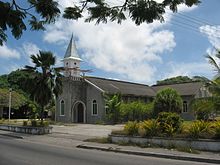Christianity is the largest religion in Nauru, with Nauru Congregational Church being the largest denomination, encompassing 35.71% of the population as of the 2011 census.
Religion in Nauru, based on the 2011 census[1]

Freedom of religion is a constitutional right, and the country's laws and society uphold this right without any significant breaches.
Demographics
editAccording to the 2011 census, the island was 95% Christian; one-third of Christians were Catholic.[2]
The largest Protestant denomination was the Nauru Congregational Church, while the Nauru Independent Assembly of God and the Nauru Independent Church both had 10% or more of the island as members.[2]
The ethnic Chinese people living on the island (approximately 5% of the population) were mainly Confucian, Buddhist, Taoist, Christian, or nonreligious.[2]
Members of the Jehovah’s Witnesses, Seventh-day Adventists, Baptists, and The Church of Jesus Christ of Latter-day Saints made up the final 1% of the population.
The largely Christian communities of Tuvaluan and I-Kiribati expatriates were repatriated in late 2006 following the near cessation of phosphate mining in the country.[3]
Nauruan indigenous religion was the predominant religion in Nauru before the late nineteenth and early twentieth centuries, when foreign missionaries introduced Christianity to the island.[3] In the early 2000s, there were a few active Christian missionary organisations, including representatives of Anglicanism, Methodism, and Catholicism.[3]
According to data from Pew Research, the religions of Hinduism, Judaism, and Islam had a small presence in the island, with about 0.1% of the population (fewer than ten people), adhering to each faith. With the exception of detainees in Nauru Regional Processing Centre, in which majority are Muslims, with significant minority of Buddhists and Hindus, although the population were slowly decreasing due to re-settlement program by the Australian Government.[4]
Estimates in 2020 suggested that 75% of the island had a Christian background, 10.5% of the population followed Chinese folk-religion, 9% were Baha'i and almost 5% had no religious beliefs.[5]
Religious freedom
editThe constitution of Nauru provides for freedom of conscience, thought, and religion, as well as freedom to change one’s religion or beliefs.[2]
Religious groups are required to register with the government in order to proselytize, build houses of worship, hold religious services, or officiate marriages. As of 2022, religious groups are required to have 750 members to register.[2] In the past, local religious leaders noted that in practice the only activity which is restricted for unregistered groups is marriage officiation.[6]
Religious groups are allowed to operate private schools. In public schools, religious groups are allowed to provide religious studies courses once a week during school hours, but they are not required to do this. Students are expected to attend courses pertaining to their chosen religious denomination; other students are expected to use the time as an independent study period.[2]
According to a 2022 US government report, there are no significant societal limits on religious freedom in Nauru.[2] In the past, some elements of the Nauru Protestant and Roman Catholic communities have occasionally voiced discomfort with religious groups they perceived as foreign, in particular the LDS Church and the Jehovah's Witnesses.[3]
See also
editReferences
edit- ^ "Nauru 2011 Census Report Final" (PDF). Republic of Nauru. p. 56. Retrieved 28 November 2018.
- ^ a b c d e f g US State Dept 2022 report This article incorporates text from this source, which is in the public domain.
- ^ a b c d International Religious Freedom Report 2007: Nauru. United States Bureau of Democracy, Human Rights and Labor (September 14, 2007). This article incorporates text from this source, which is in the public domain.
- ^ "Human Truth web site, Nauru (Republic of Nauru)".
- ^ The ARDA website, retrieved 2023-08-28
- ^ International Religious Freedom Report 2017 § Nauru US Department of State, Bureau of Democracy, Human Rights, and Labor.